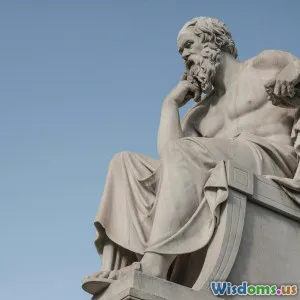
Mythical Narratives and Personal Growth
7 min read Explore how mythical stories inspire personal growth, guiding self-discovery and resilience through timeless lessons. (0 Reviews)
Mythical Narratives and Personal Growth
Mythical stories have captivated civilizations for millennia, presenting archetypes and adventures that transcend time, culture, and geography. While these narratives often entertain, they also offer profound lessons on human nature, challenges, and growth. In the modern pursuit of self-improvement and emotional resilience, ancient myths provide powerful insights and models for personal transformation.
The Power of Myth: More Than Just Stories
At first glance, myths and legends may appear as mere stories of gods, monsters, and heroes. However, these narratives embody archetypal themes reflecting the human psyche. Carl Jung famously emphasized myths' role in expressing the "collective unconscious," where universal symbols resonate with innate human emotions and experiences.
For example, Joseph Campbell’s concept of the "Hero’s Journey" is a critical framework in understanding how individuals face trials and evolve. This pattern, spanning from the trials of Odysseus to Luke Skywalker's quest in Star Wars, involves separation, initiation, transformation, and return — mirroring internal psychological growth.
Heroic Journeys as Blueprints for Personal Development
The Hero’s Journey presents a roadmap for confronting fears and limitations. This narrative structure begins with a "call to adventure," symbolizing moments in life when an individual faces growth opportunities.
- Call to Adventure: Just as King Arthur heeded the call to pull Excalibur from the stone, people must answer vital personal or professional challenges.
- Trials and Challenges: The hero encounters obstacles, reflecting the real struggles we face such as failure, rejection, or hardship.
- Transformation: Overcoming challenges results in newfound wisdom or strength.
- Return: The hero returns transformed, often bringing new insights to their community.
For instance, the story of Hercules and his twelve labors symbolizes persistence against insurmountable odds, establishing a metaphor for endurance and resilience in personal growth.
Archetypes and Their Role in Self-Understanding
Mythology divides human qualities into recurring archetypes we identify with consciously or unconsciously. Understanding these can foster deeper self-awareness.
- The Shadow: Representing the unknown or repressed self, akin to the beasts heroes face in myths, acknowledging this aspect is crucial for emotional maturity.
- The Mentor: Figures such as Athena in Greek mythology guide heroes, analogous to mentors or guides in real life who promote growth.
- The Trickster: Often challenges norms and provokes change, demonstrating the value of questioning and adaptability.
These archetypes illustrate that personal growth is not linear but encompasses confronting internal contradictions. Psychologist Carl Jung advised integrating the shadow self as part of individuation — the realization of one's true self.
Mythology Inspiring Real-World Change
Beyond psychology, myths have motivated historical and contemporary figures to effect transformation. For example, Nelson Mandela often referenced heroic resilience through personal suffering, echoing mythical endurance.
Moreover, cultural mythologies influence therapeutic practices such as narrative therapy, where clients reframe personal stories similarly to mythical storytelling, fostering empowerment and healing.
Modern literature and media continue revitalizing myths, making archetypal journeys accessible and inspiring audiences worldwide to cultivate courage, purpose, and empathy.
Practical Applications: Integrating Myth into Personal Growth
To tap into the power of mythical narratives, consider the following approaches:
- Identify Personal Myths: Reflect on stories that resonate personally. What hero’s journey parallels your life?
- Journal Through Archetypes: Explore which archetypes dominate your behavior or hold you back.
- Visualize Transformation: Use mythical motifs like dragon battles or labyrinth navigation as metaphors for obstacles you face.
- Embrace Mentorship: Seek guidance mirroring mythical mentors.
- Craft Your Narrative: Like myths evolving orally, reshape your life story to emphasize growth and resilience.
One real-world example is Viktor Frankl, a Holocaust survivor and psychiatrist, who, in his book Man’s Search for Meaning, parallels human suffering with heroic endurance, encouraging readers to find purpose amidst trials.
Conclusion: The Timeless Relevance of Myth
Mythical narratives serve as enduring guides to personal growth by symbolizing complex psychological processes and human struggles. They provide concrete metaphors and archetypes that distill vast human experience into digestible, transformative lessons. By engaging consciously with these stories, individuals unlock pathways to self-discovery, resilience, and meaningful transformation.
In a world rife with rapid change and uncertainty, embracing the wisdom encoded in myths offers not just an escape into enchanting tales but a practical blueprint for navigating life’s deepest challenges and actualizing our fullest potential.
As Joseph Campbell eloquently stated, "We must be willing to get rid of the life we've planned, so as to have the life that is waiting for us." Mythical narratives remind us that the journey to that life often begins with answering the call to adventure within each of us.
Rate the Post
User Reviews
Popular Posts





















